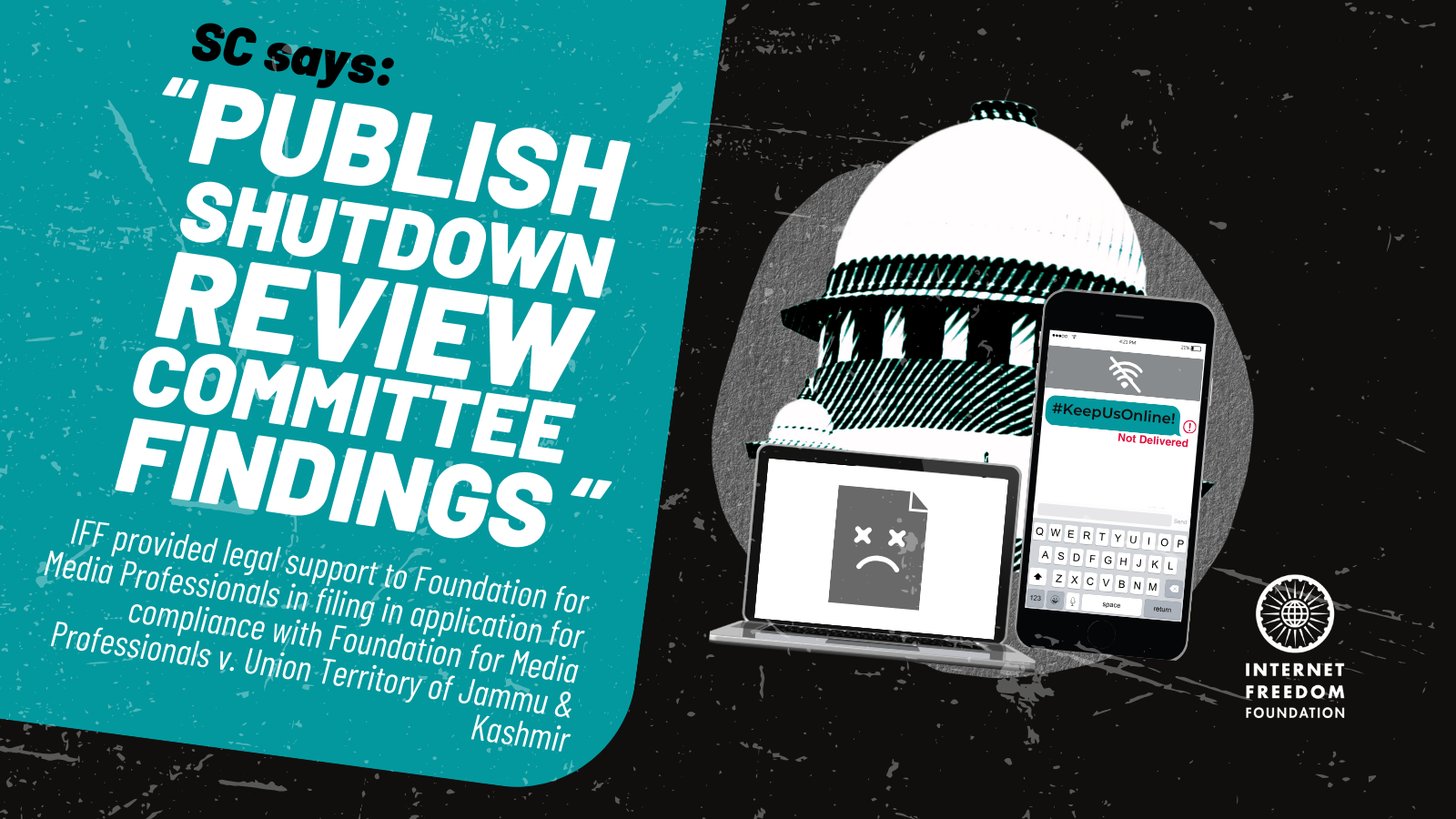
Tl;dr
The Supreme Court of India has taken the prima facie view that while deliberations may not necessarily be published, findings of the Review Committee pertaining to internet suspension must be published. This was noted in an Order passed in a miscellaneous application filed on behalf of Foundation for Media Professionals (“FMP”) in Foundation for Media Professionals v. Union Territory of Jammu (“4G Judgement”) and Kashmir which sought the release of the findings of the Review Committee as per the guidelines of the Supreme Court in Anuradha Bhasin v. Union of India (“Anuradha Bhasin”). Despite the directions of the Supreme Court, all orders relating to internet shutdowns are not published in a timely fashion, obscuring details on the legality and the validity of the shutdowns.
Why should you care?
In Anuradha Bhasin v. Union of India, the Supreme Court had declared that orders imposing an internet shutdown are to be made publicly available. This declaration extended to orders of the Review Committee as well. The role of the Review Committee, as is to be formed under Rule 2(5) Temporary Suspension of Telecom Services (Public Emergency or Public Safety) Rules, 2017 (‘Telecom Suspension Rules’), is crucial in ensuring that the internet shutdowns are subject to some oversight and to ensure that they are legal and necessary. The order of the Supreme Court directing that the Review Committee findings be published ensures that the functioning of the committee remains transparent and accessible to the public, limiting indiscriminate and unjustified use of the powers conferred to impose internet shutdowns.
Background
On May 11, 2020, the Supreme Court delivered the 4G Judgement in a petition filed by the FMP seeking restoration of 4G mobile internet services in Jammu & Kashmir during the COVID-19 pandemic. The Supreme Court constituted a Special Committee comprising (i) Secretary, Ministry of Home Affairs, (ii) Secretary, Department of Telecommunications, and (iii) Chief Secretary, Government of Jammu & Kashmir to immediately review the 4G mobile internet ban. In particular, the Special Committee was directed to examine the material placed on record by all parties and consider the viability of less restrictive alternatives suggested by the petitioner.
Due to unavailability of any information on the functioning of the Special Committee in the public domain, FMP was constrained to file a contempt petition. It is further important to mention that subsequent to the judgment, orders imposing internet suspension which had neither been reviewed by the Review Committee nor the Special Committee had also been passed. Aggrieved by how such restrictions on the internet were being imposed, without any sense of “emergency” or “urgency”, we filed a Miscellaneous Application on behalf of FMP seeking compliance with Anuradha Bhasin as well as the Telecom Suspension Rules.
Proceedings before the Supreme Court
On behalf of the Foundation for Media Professionals, IFF filed a miscellaneous application seeking the publication of orders of the Review Committee passed in the Union Territory of Jammu and Kashmir, which were being withheld from publication. Previously, in 2021, FMP had sent a legal notice to the Union Territory of Jammu and Kashmir seeking the publication of the orders of the Review Committee concerning a spate of internet shutdowns in the UT.
On January 31, 2024, Advocate Shadan Farasat, arguing on behalf of FMP, submitted that all orders passed in relation to an internet shutdown need to be made freely available to the public and that this included orders passed by the Review Committee orders. Mr. Farasat argued that these orders have been mandated by a statute and that the failure to do so was against the spirit of the Order of the Supreme Court in Anuradha Bhasin as well as the Telecom Suspension Rules.
At this juncture, the Supreme Court Bench comprising of Justices B.R. Gavai and Sanjay Karol asked the State as to whether they were willing to make a statement on the aspect of Review Committee orders being published. To this, the State responded that they would seek instructions. They have accordingly been directed to respond within two weeks.
During the course of the hearing, Justice Gavai orally observed that orders of the Review Committee “could not be kept in the cupboard”. It held a prima facie view that though deliberations of the Review Committee need not be published, however, the Orders need to be uploaded in the public domain.
This is a win for transparency as Review Committee orders are rarely published. Given the lack of accountability surrounding imposition of restrictions on the internet as well as the indiscriminate issuance of internet suspension orders, publication of orders of the Review Committee will curb orders with no application of mind or nexus with the object sought to be achieved from being published.
We are first and foremost grateful to FMP for allowing us to assist them in a matter of such importance and for trusting us in this fight for digital rights!
We were also represented by an able team led by Advocate Shadan Farasat and consisting of Advocate Natasha Maheshwari, and IFF’s Legal Team comprising Advocates Gautam Bhatia, Vrinda Bhandari, Abhinav Sekhri, Radhika Roy, and Gayatri Malhotra. We shall keep you updated on what happens next!
This post was drafted by IFF Legal Intern Sanat Narayan and reviewed by Litigation Counsel Radhika Roy.
Important Documents:
1. Order dated 31.01.2024 (link)

